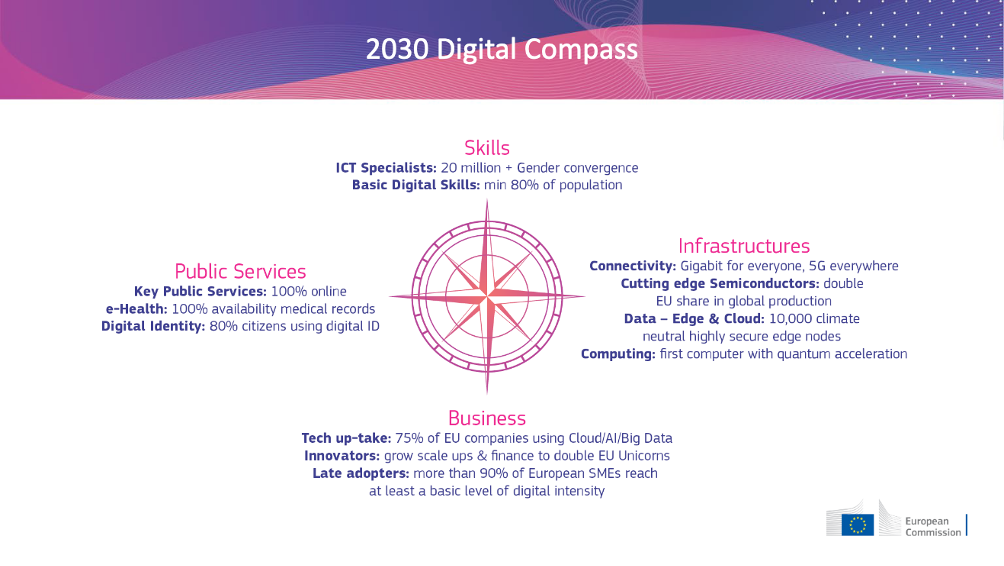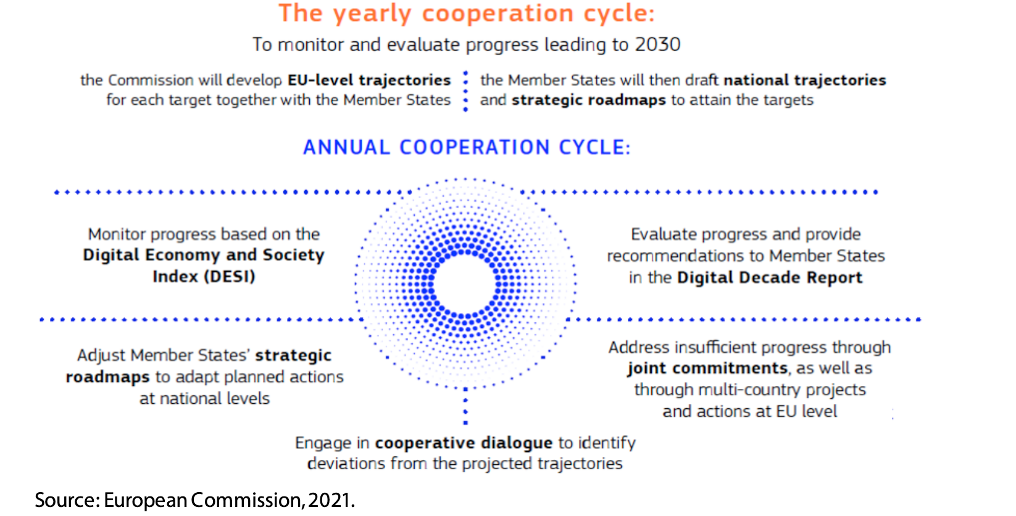European Commission - The 2030 Policy Programme “Path to the Digital Decade”
The Path to the Digital Decade is a policy programme which must ensure that the EU meets specific digital targets in line with EU values. The targets focus on four areas: skills, infrastructures, businesses and public services. To reach the common objectives, the member states will work together, assess progress and take actions (optional via joint commitments or multi-country projects).
What: Policy orienting document
Impact Score: 3
For who: Policy makers, businesses, researchers, citizens
Key takeaways for Flanders:
- Following the entry in to force of the program, Member States should propose strategic national roadmaps to pursue the digital targets at the national level (within nine months)
URL: https://data.consilium.europa.eu/doc/document/PE-50-2022-INIT/en/pdf
The Path to the Digital Decade policy programme should be seen together with the European Commission's Digital Compass (in which the Commission laid out its vision for 2030 to empower citizens and businesses through digital transformation and established a structure to measure progression) and the Digital Strategy. From this digital journey, the European Declaration on Digital Rights and Principles for the Digital Decade and the policy programme Path to the Digital Decade have emerged.
The Path to the Digital Decade policy program is a comprehensive plan aimed at accelerating the digital transformation of the European Union (EU) and its member states. The program focuses on the four key areas of the 2030 Digital Compass:

One of the key elements of the program is the promotion of large-scale multi-country projects and joint commitments. Multi-country projects aim to channel coordinated investments between the EU, at least three Member States and, where appropriate, other public or private stakeholders in order to scale up and better target investments in strategic technological areas (such as 5G, quantum computing, connected public administrations etc.). Examples of multi-country projects include the European Open Science Cloud and the European Data Infrastructure. To set up a multi-country project, where there is no other legal instrument, the policy programme envisages a new legal structure, the European Digital Infrastructure Consortium (EDIC).
The role of multi-country projects and joint commitments (cooperation mechanisms) is to ensure that the EU's digital transformation is inclusive and benefits all member states. By working together on digital projects, member states can share knowledge, expertise, and resources, which can help to overcome barriers to digital transformation and accelerate the adoption of digital technologies.
Together, the Digital Decade objectives and targets will guide the actions of Member States, which will be assessed by the Commission in an annual progress report, the State of the Digital Decade. A new high-level expert group, the Digital Decade Board, will also reinforce the cooperation between the Commission and the Member States on digital transformation issues. Additionally, joint commitments ensure that all member states are
working towards a common goal and that the EU's digital transformation
is aligned with the goals of the European Union.

Next steps
In the coming months, the Commission will adopt an implementing act defining the KPIs for the digital targets and will develop projected EU trajectories for each of them together with Member States.
In June, the Commission will publish the first State of the Digital Decade report, to provide an update, assessment, and recommendation on progress towards the targets and objectives.
In October, Members States will submit their first national strategic roadmaps, on which the Commission will have published guidance to support them.